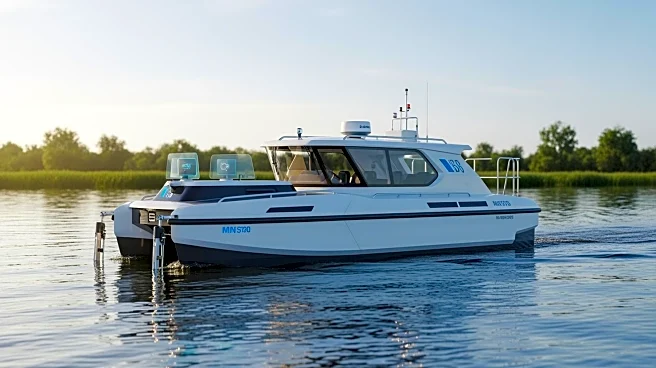What's Happening?
The market for self-navigating waterway maintenance boats is projected to witness substantial growth from 2025 to 2032. A recent report by Worldwide Market Reports highlights the expected expansion in terms
of value and volume, driven by advancements in technology and increasing demand for efficient waterway management solutions. Key players in the market include Sea Machines Robotics, Ocean Infinity, and ASV Global, among others. The report provides a detailed analysis of market drivers, challenges, opportunities, and restraints, along with a competitive landscape overview. It also includes regional trends, revenue forecasts, and market segmentation insights.
Why It's Important?
The growth of the self-navigating waterway maintenance boats market reflects a broader trend towards automation and efficiency in maritime operations. These boats offer solutions for aquatic vegetation management, sediment removal, debris collection, and environmental data collection, among other applications. The adoption of self-navigating technology could lead to more sustainable and cost-effective waterway maintenance practices, benefiting industries such as commercial shipping, recreational boating, and environmental monitoring. The market expansion could also drive innovation and investment in related technologies, enhancing the capabilities of maritime operations.
What's Next?
As the market for self-navigating waterway maintenance boats continues to grow, companies are likely to invest in research and development to enhance the functionality and efficiency of these vessels. The report suggests that strategic initiatives and product development plans by major market participants will shape the future of the industry. Stakeholders and investors may focus on emerging trends and growth drivers to make informed decisions and capitalize on market opportunities. The ongoing advancements in technology could lead to new applications and solutions in waterway maintenance.
Beyond the Headlines
The integration of self-navigating technology in waterway maintenance raises questions about the impact on employment and the role of human operators in maritime operations. Ethical considerations regarding the use of autonomous systems in environmental monitoring and emergency response are significant, potentially influencing regulatory frameworks. Additionally, the focus on sustainability and efficiency in waterway maintenance could contribute to broader environmental conservation efforts.









